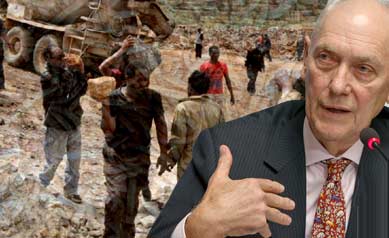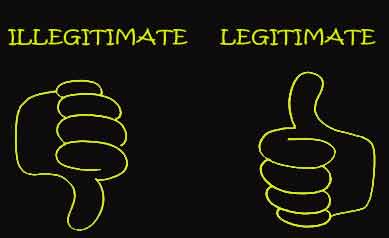The Riddle of The Unpredictable
![]()
We are faced with the Liar’s Riddle. Two doors, one guarded by a compulsive liar, one guarded by a compulsive truth-teller. One door leads to heaven, one to hell. The guards are identical twins. Your objective is to go to heaven. If you could ask one, and only one question, who would you ask it to and what would it be? Answer at the end: unless you are impatient and Google it.
Let’s wait for the impatient to google it. Meanwhile, here is Abulhalim Hafez and his song Qariat al finjal (fortune teller) which is appropriate for our subject:
[youtube]http://www.youtube.com/watch?v=d80vagJKR9k.[/youtube]
Your eyes are not deceiving you: the song is 1 hour and 20 minutes long.
Why, of course, Eyob, I know how much you love Egypt, I shall share a stanza:
Your fate is to forever walk
In love, over the blade of a dagger
And to stay lonely, like a shell,
And to stay sad, like a willow tree
We have our own riddle, which is why the clues from Isaias Afwerki’s latest interview have wide interpretations. This is the riddle: the man’s hold to absolute power is based to a large extent on being unpredictable. If people can guess your next move, they can checkmate you. To maintain your unpredictability, you must sometimes say things that you will do, and sometimes the exact opposite of what you will do. So, the options:
1. You give categorical statements that there will never, ever (not yesterday, not today, not tomorrow) be normalization with Ethiopia until it withdraws from Eritrean territories. Then you normalize relations. Mission Accomplished: you are unpredictable.
2. You give clues, hints and direct statements that you are embracing interdependence over self-dependence. That change is coming. Then you don’t do it. Mission accomplished: you are unpredictable.
So, this is the fortune-telling that has been going on since last weekend. Our very able Haile, who summarized the interview for awate readers, seems to be persuaded that something is in the offing and he has been throwing us dots to connect them: the tone was different; Ethiopian leaders are no longer described as kedemti but goblel; there is focus on the importance of regional cooperation for nation-building; there has not been a denial and/or pre-conditionality from Ethiopia: quite the opposite, the outgoing Ethiopian president told Voice of America that he intends to visit Asmara (as a private citizen, of course); and, the evidence suggests that the “self-reliance” policy has hit a dead-end (as it has in every country it was tried: North Korea, Tanzania, etc.)
This sounds all logical. But that is exactly the problem: logical, by definition, means rational, sequential, predictable. And that violates the first rule of Isaias Afwerki: do not be predicable. These are Isaias’s Rules:
1. Never do anything until you are absolutely, positively, completely cornered.
2. Never tell anybody in advance–never hint, never suggest, never imply–what your next move is going to be. Life is war and the element of surprise must always be maintained.
3. Whatever you do, do it in a way that humiliates Eritreans.
1. The “Is He Cornered?” Test
With respect to item 1 above, there is enough evidence that suggests he has hit a dead-end. Eritrea is essentially joining the Heavily Indebted countries club; every economic sector is in tatters and, most important to him, he has no leverage in the region: there are no Western countries courting him because they want him to protect their interest. The Ethiopian opposition is not kidnapping foreigners; the Somali pirates are not holding people for ransom; the Islamic fundamentalists have been de-clawed; Sudan and Somalia are RELATIVELY stabilized (because of, and despite, his efforts.)
The only card he’s got left is the Red Sea and whatever grand ideas he had planned by threatening to bring Iran just didn’t work out because all Iran needed was to make token investments in Africa (including Eritrea) so it can get observer status membership in the African Union. Turkey knocked at the door–but Turkey will not do anything that puts the interests of the West at stake…so the Red Sea (and specially its ports, Massawa and Assab) remain what they have been for the last 15 years: ghost towns. The human trafficking route will likely trickle if the Egyptian government continues to assert itself in Sinai; we know how much money mining is generating (not much) and the Diaspora Tax (2%) seems to face hurdles. So, all in all, it appears like the walls are closing in.
2. The “Never Telegraph Your Next Move” Test
This is the riddle. I say part of what makes him unpredictable is that he never hints at his next move. But then, say Awatistas like Sabri and Haile, if he is always expected not tell us what to do, that in itself is predictable so, to be totally unpredictable, sometimes he must telegraph his next moves. They say just because he has done things a certain way does not mean he will always do things a certain way: that is the very definition of predictability.
When I say “never telegraph your next move”, I mean it mostly in foreign policy. He does telegraph his next move very strongly when it comes to taking decisions he considers would be potentially unpopular. For example: the arrest of the G-15 twelve years ago this month. That one required an intense 9-month campaign of defamation–but that was NOT done in mass media (no television interview with the head of state.) It was done the Wahyo Way: “political seminars” of PFDJ cadres, civil servants and soldiers. Defame, isolate, disappear.
But for foreign policy? Nobody knew Eritrea would reconcile with Sudan. Nobody knew Eritrea would go to war with Ethiopia. Nobody knew that Eritrea had withdrawn from IGAD until it did. And nobody knew Eritrea had returned to IGAD until it did. Whatever conditions existed when Eritrea withdrew to protest something IGAD did (failure to condemn Ethiopia for its foray in Somalia), remained when Eritrea returned. Nobody was given a signal that Eritrea would recognize the government of Somalia–after repeated and categorical statement that it was “mengisti Mogadishu“, that we recognize only one Somalia (including Puntland and Somaliland.)
3. The “Humiliation Test”
This takes me to my last test: whatever reversals he does, Isaias always does them in a way that inflicts maximum humiliation on Eritreans and the reputation of the State of Eritrea. I know there are people who believe that this is by design, that he hates the Eritrean people and they give heritage stories, but I am not into that. It is simply the inevitable outcome of a man who believes that you can always defer decisions until the very last second, and that you must not consult with ANYONE about your decision. (And I do mean ANYONE: those of you who believe people like Yemane Gebreab are insiders who know everything just need to revisit the story of what happened when Naizghi Kflu died: Yemane Gebreab assured Naizghi’s wife that her husband would be buried in Eritrea, then he was reminded that he is a nobody and not authorized to give such assurances.)
Now, do I need to go through the entire list of humiliating reversals? I think not because they will just poke the wounds of Eritreans, specially war veterans. But I will give a few that are not designed to hurt, but shake our heads in amazement:
I. Eritrea- US Relations
a. In 2001, Eritrea accused US envoy Anthony Lake of colluding with the G-15 in an attempt to assassinate Isaias Afwerki.
b. In 2002-2003, Eritrea spent 600,000 (USD) on an American lobby firm to convince the US to establish a military base in Eritrea. Isaias told an American journalist (who was telling his readers that the US is choosing between Yemen and Eritrea, that Eritrea would be a better choice) that he, Isaias, believes the presence of America is necessary in the Horn of Africa. He told a visiting US Defense Minister that “the sky is the limit” as to the help Eritrea would extend the US. The US ended up choosing Djibouti.
c. Because the US didn’t live up to its perceived role in guaranteeing the implementation of the EEBC, Isaias went on a rampage and he started telling a new version of history. He criticized the Iraq War (despite the fact that he had said the only mistake the US made was in seeking UN approval before attacking Iraq and that Eritrea was one of the few African countries which joined the “coalition of the willing”); he criticized the hegemonic role of the US (a hegemonic role he had actively courted).
d. He rejected repeated offers by Secretary Clinton to engage.
e. Thus, the only country which could have vetoed the sanction (the US) was behind it after his repeated attempts to frustrate it and its goals in Somalia.
II. Eritrea-Djibouti Relations
a. He repeatedly denied to the UN that he had a war with Djibouti and he repeatedly rejected its call that he engage Djibouti.
b. Eritrea was sanctioned partly as a result of its refusal to deal with the Djibouti skirmish.
c. He accepted Qatar’s mediation agreement to resolve Eritrea’s dispute with Djibouti– an agreement that addresses border delimitation and exchange of prisoners of war. How can you have prisoners of war if there is no war?
d. To this day, his media refuses to acknowledge the war, the prisoners of war, or even the mediation agreement.
III. Eritrea-Somalia relations
a. The government of Isaias Afwerki repeatedly said that it would never recognize the government of Somalia.
b. It was supporting, hosting all kinds of “stakeholders” in Asmara and Isaias went out on a limb saying that “Al Shabab” are not terrorists–even after they had pledged allegiance to Osama Bin Laden
c. Now he recognizes the government of Somalia. There was no interview about this, no policy change: simply a letter from Eritrea’s ambassador to the UN, Araya Desta, addressed as a rebuttal to the monitoring group’s report.
So, the real question now is: is Isaias Afwerki stalling, lying when he is hinting about complementarity, and given the context–energy–that can only mean Ethiopia?
That’s the riddle and, as the pundits like to say when they are stumped, “time will tell.” (Duh.) Personally, I do not think anything will come out of it because it doesn’t meet Test 2 and Test 3 above. What is more likely to happen, if it happens, is a sudden and abrupt change. And, when it does, the interview will not be with Eri-TV but Ethiopian state television. (Must pass test 3 above.)
Now, the answer to the Liar’s riddle (for those of you who were patient): you ask one of the twin guards (it doesn’t matter who), “hey, if I ask the other guard which door leads to heaven, what would his answer be?” And then you pick the opposite of what he says. Too bad, Eritrea doesn’t have, yet, the anti-thesis to Isaias’s thesis.
saay



Awate Forum